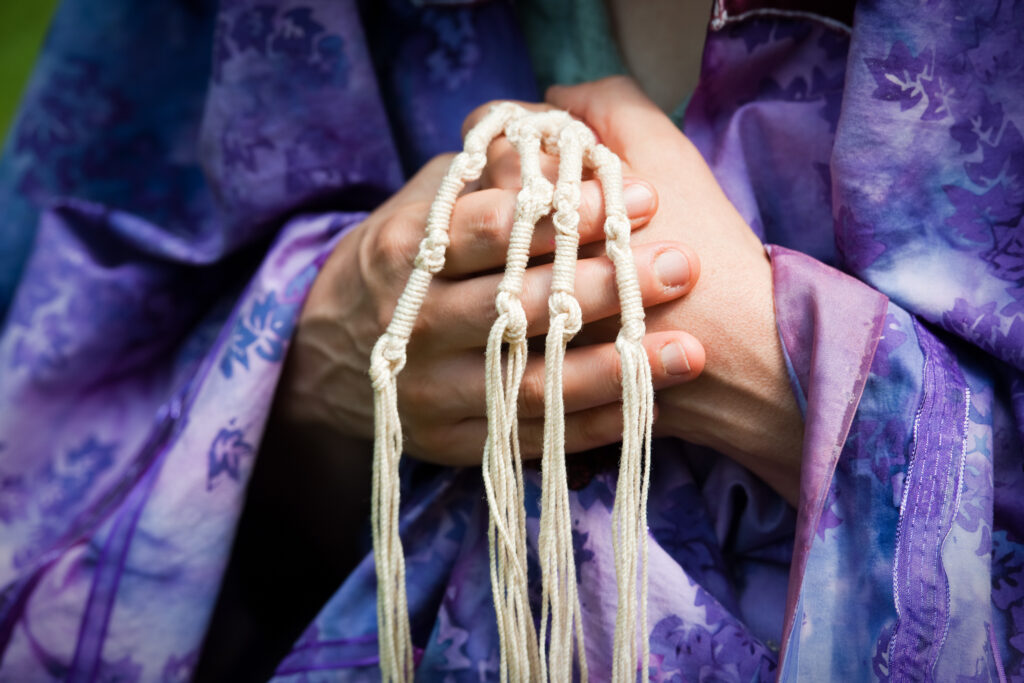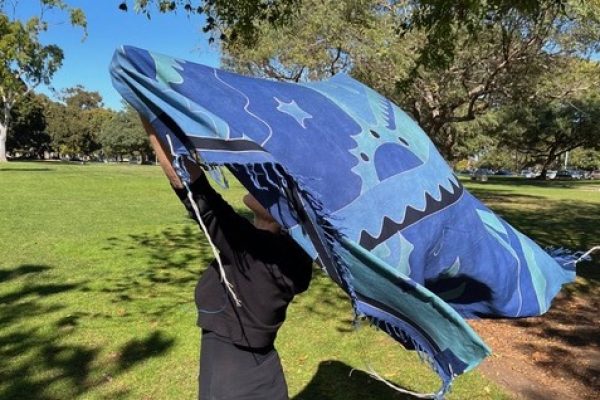After the #ReimagineBnaiMitzvah chat, what emerged for me most strongly were not answers but questions. People tweeted a lot of questions: how can we encourage students to take ownership of their own b’nai mitzvah journey? Is there a way to do b’nai mitzvah which doesn’t reinforce binary notions of gender? How can we tend to the unique soul of every child, regardless of where they are on the spectrum of gender and sexuality? Is there a core body of material which we expect our b’nai mitzvah students to master? What kind of role does (or should) social justice play in their learning?
These prayers arose in response to the chat. I hope that they will speak to our b’nai mitzvah students, to those who are entrusted with their care—and also to people in “traditional” congregational contexts, and people whose Jewish lives unfold outside of congregational walls.
Before the formal celebration: Prayers before tying tzitzit
You might choose to begin by singing or reading these words from Torah which are part of the Shema. (English translation is singable to the same trope melody as the Hebrew.)
וַיּאֹמֶר יְיָ אֶל-מֹשֶׁה לֵּאמֹֽר: דַּבֵּר אֶל-בְּנֵי יִשְׂרָאֵל וְאָֽמַרְתָּ אֲלֵהֶם: וְעָשׂוּ לָהֶם צִיצִת
עַל-כַּנְפֵי בִגְדֵיהֶם לְדֹֽרֹתָם, וְנָֽתְנוּ עַל-צִיצִת הַכָּנָף פְּתִיל תְּכֵֽלֶת. וְהָיָה לָכֶם לְצִיצִת,
וּרְאִיתֶם אֹתוֹֹ וּזְכַרְתֶּם אֶת-כָּל-מִצְוֹֹת יְיָ, וֽעֲשִׂיתֶם אֹתָם, וְלאֹ תָתוּרוּ אַֽחֲרֵי
לְבַבְכֶם וְאַֽחֲרֵי עֵֽינֵיכֶם, אֲשֶׁר-אַתֶּם זנִֹים אַחֲרֵיהֶֽם:
Transliteration:
Vayomer Adonay el-Moshe lemor: Daber el-b’ney Yisrael v’amarta alehem: v’asu lahem tzitzit
Al-kanfei vigdeyhem lidrotam, v’natnu al-tzitzit hacanaf p’til t’khelet. V’hayah lahem l’tzitzit
Ur’ittem oto u’zkhartem et-kol-mitzvot Adonay, v’asitem otam, v’lo taturo akherei
L’vavkhem v’acharey eyneykhem, asher atem zonim akhareyhem.
English:
And God spoke to Moses saying: speak to the children of Israel and say to them
that they should make tzitzit on the corners of their garments for all time,
and they shall place on the tzitzit a little thread of blue.
And these shall be for you as tzitzit, that you may look upon them,
that you will remember all of the mitzvot of Adonai and you shall do them,
so that you will not go running after the cravings of your heart
or the turnings of your eyes which might take you into places
where you should not be!
לְמַעַן תִּזְכְּרוּ וַעֲשִׂיתֶם אֶת-כָּל-מִצְוֹֹתָי, וֽהְיִיתֶם קְדֹשִים לֵאלֹֽהֵיכֶם: אֲנִי יְיָ אֱלֹֽהֵיכֶם
אֲשֶׁר הוֹֹצֵאתִי אֶתְכֶם מֵאֶרֶץ מִצְרַיִם, לִהְיוֹֹת לָכֶם לֵאלֹהִים, אֲנִי יְיָ אֱלֹֽהֵיכֶֽם:
Transliteration:
L’ma’an tizk’ru va’asitem el-kol-mitzvotai, vi’hey’yitem k’doshim leieloheikhem: Ani Adonay eloheikhem
Asher hotzeti etkhem me’eretz Mitzrayim, l’hiot lakhem le’elohim, Ani Adonay eloheikhem.
English:
So that you may remember and do all of My mitzvot
and that way be holy with your God.
I am Adonai your God,
The One Who brought you
out of the land of Egypt
to be your God.
I am Adonai your God!
For the rabbi, parent, or teacher:
Torah instructs us
to tie tzitzit on the corners of our garment
so that we may look upon them
and remember the mitzvot.
Mitzvot are connections
which link us with Torah
and link us with God
and link us with our ancestors.
Tzitzit adorn the edges
of our prayer shawls
as mezuzot adorn the edges
of our doorways.
We find holiness at the edges
between day and night
between inside and outside
between childhood and adulthood.
When you wrap yourself in this tallit
may you feel enfolded
in the loving embrace
of the Divine.
When you notice your tzitzit
may you be reminded
to lead a life of mitzvot
and awareness.
For the b’nai mitzvah:
I am taking up these threads
with the holy intention
of tying tzitzit
which will remind me
of God and of my traditions.
The following trio of prayers is meant to be usable in a variety of contexts (whether at a congregational celebration, or in a different setting) and for a variety of young adults (no matter what their gender expression.)
Parent/Caregiver’s Prayer
Today you take responsibility
for your own Jewishness
and your own practice of mitzvot.
Becoming b’nai mitzvah means
that the Torah is “yours”
in a new and deeper way:
yours to learn and to teach,
to question and to celebrate.
Becoming b’nai mitzvah means
that the mitzvot are “yours”
in a new and deeper way:
yours to practice and to wrestle with,
to strive to understand.
Today as you reach the age of mitzvah
you mark a milestone
in your transition to adulthood.
Though tradition teaches that today
your good deeds and your mistakes
accrue to your karmic balance
and no longer to mine,
may I still be privileged
to walk beside you and offer guidance.
And I look forward
to continuing to learn from you
as you become the person
you most deeply yearn to be.
May we, your community and your family,
be a blessing for you
as you are a blessing for us.
B’nai Mitzvah‘s Prayer
I am ready and willing
to take on mitzvot
as a Jewish young adult.
Today I affirm
that my Jewishness matters to me.
I promise to take seriously
my Jewish obligation
to take care of others
and to care for our earth.
I promise to take seriously
my relationship with Torah
even when it upsets me.
I promise that I will never stop learning.
When Moses stood
at the Burning Bush
God identified God’s-self
as אהיה אשר אהיה, “I am Becoming
Who I am Becoming.”
God is always
becoming something new
and so am I.
I don’t know what my future holds
but I will meet that future
as a Jew.
I will try to question
and I will try to love the stranger
and I will try to be grateful
starting right here,
right now.
Rabbi’s Prayer for the Family
Today marks a transition
for all of you.
Whether you live
under one roof or several,
whether you are related
by blood or by affection
you are family to one another
and your lives are all impacted
by this milestone.
Perhaps recent months
have been filled with the lilt
of Torah practice.
Perhaps you helped
our b’nai mitzvah
in doing acts of justice
and lovingkindness.
Perhaps you have been
a shoulder to cry on.
Perhaps you have needed
a shoulder to cry on.
Take a deep breath…
…and let it all go.
Be in this moment:
surrounded by those who love you,
celebrating this milestone with community
in the presence of God.
May the sweetness of this day
stay with you
as you walk the road ahead
toward this b’nai mitzvah
becoming more truly
the person they are meant to be.
יְבָרֶכְךָ יְיָ וְיִשְׁמְרֶךָ
Y’varekha Adonay V’yismarekha
May God bless you and keep you.
יָאֵר יְיָ פָּנָיו אֵלֶיךָ וִיחֻנֶּךָּ
Ya’er Adonay panav el’lekha vi’khunekha
May God make Her face shine upon you and be gracious to you.
יִשָׂא יְיָ פָּנָיו אֵלֶיךָ וְיָשֵׂם לְךָ שָׁלוֹם
Yisah Adonay panav elekha v’yasem l’kha shalom
May God cause His face to be always before you
and bring you peace.
(And let us say: Amen.)











